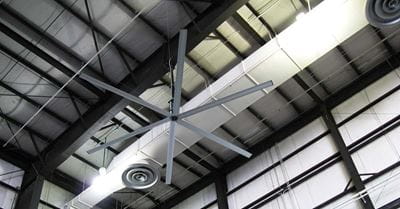HVLS Fans | Nogales, AZ

For plants or warehouses, HVLS fans can have a significant influence on both heating and cooling costs and worker morale.
What Is An HVLS Fan?
An HVLS, fan, short for “High Volume, Low Speed” fan is an oversized ceiling fan that rotates at very low speeds and distributes warm or cool air through a space. They are typically put to use in areas with elevated ceilings, such as production plants, warehouses, and other industrial operations.
In warm climates or during the summer, these types of fans can expel excess moisture from the atmosphere by supplanting high temperature, moist air with drier air. During cooler months, they can also help manage the indoor climate by fully circulating warm air through a building.
HVLS Fan Size
HVLS fans are a minimum of 84 inches across. Some fans can be as much as 24 feet across, although for the majority of commercial designs multiple smaller fans are required. Fan capacity varies, but the majority of units are between five eighths and one horsepower.
Though most HVLS fans are designed for ceilings, a few specialty fans can be designed to be installed on floor mounted masts.
How Do HVLS Fans Work?
An HVLS fan’s effectiveness is due to its low RPM and large scale. HVLS fans generate huge segments of air that travel at low speed, in contrast to the fast-moving, smaller air currents that are produced by ordinary fans. Turbulent, rapid airflow from smaller fans produces friction against still air and speed rapidly dwindles.
With large-scale fans, the massive air currents move more gradually and go much further as a result of diminished air friction. Consequently, it requires less electricity to move larger volumes of air at a slower rate than is needed to drive smaller amounts of air at a more rapid rate.
The difference in energy consumption is startling. Moving air at 6 miles per hour takes nearly 27 times as much energy as moving air at 2 miles per hour. The bottom line is this: you're much better off running larger fans a very low speeds versus smaller fans at high speeds.
Warehouse HVLS Fan Benefits
Reduce Heating Costs
A single HVLS fan can save a lot of money on energy during the winter months.
Air naturally stratifies in large buildings, particularly those with high ceilings. Warmer air rises to the ceiling and the cooler air stays near the ground. Heating systems must work overtime to heat the area near the floor, which costs money, while most of that warm air moves up toward the ceiling, away from people.
HVLS fans can move large quantities of heated air away from the ceiling, recirculating it throughout the building, thereby normalizing the interior climate and enabling the HVAC system to work more efficiently.
Reduce Cooling Costs
Although HVLS fans are perfect for balancing heat recirculation in a building, the opposite is also true: they can help with cooling during the summer months or in warm climates.
The fans keep air flowing throughout sizable spaces, and this airflow elicits an evaporative cooling effect. While the fan does not actually transform the temperature of the air flowing down, it will reduce moisture in the air through evaporation, producing a more agreeable environment.
Reduce Environmental Impact
While reducing energy expenses is a fantastic reason to consider HVLS fans, there is the additional advantage that reducing energy usage also shrinks a business’ carbon footprint. Over time, HVLS fans can deliver substantial reductions in energy use, particularly for businesses with numerous locations.
Enhance Employee Comfort & Productivity
Happy workers are generally more effective, so maintaining your facilities at comfortable temperatures is profitable. Several studies have shown a correlation between extreme temperatures and declines in output.
HVLS Fans For Sale Near Me
If you’re interested in learning more about the advantages of HVLS fans for your warehouse or production facility, call a material handling expert at Raymond West today.
Raymond West's Nogales facility serves Santa Cruz County and Pima County, including Nogales, Patagonia, Tucson, South Tucson, Marana, Oro Valley, Sahuarita and surrounding areas
Raymond West | Nogales Material Handling Equipment Supplier
480 N Mariposa Rd C
Nogales, AZ 85621
(520) 281-4125

